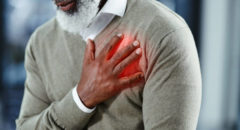
For many people, the holidays are about spending time with loved ones, reflecting on the year that has passed, and preparing for the year ahead. While the holiday season is frequently a time of happiness, researchers have for years noticed a spike in the number of heart attacks and strokes during the winter holiday season.
So why do the winter holidays increase our risk of disease, and more importantly, what can we do to reverse that trend? Well, let’s start with the why.
There are actually a multitude of reasons why the winter holiday season is associated with a peak in the incidents of both heart attacks and strokes, including:
1. Emotional Stress
Let’s be honest, folks, for most people, the holidays are a pretty stressful time. The stressors can range from simple matters like finding the perfect presents for everyone on your list to major stressors like bereavement and recent family loss. Regardless of the source, stress is stress, and all stress produces a similar physiologic response, namely the release of the so-called stress hormones (cortisol, adrenaline and norepinephrine). Among the many physical effects of these stress hormones is an increase in blood pressure and heart rate. Both of these increase the risk of heart attack, heart failure and stroke.
2. Increased Physical Exertion
The hustle and bustle of the holidays can feel never-ending; from shopping trips, to extra chores, to lifting packages, and decking the halls. Much like emotional stress, this increased physical stress results in the production of those same stress hormones which increase the risk of heart attack, heart disease and stroke.
3. Unhealthy food (high salt, fat, and cholesterol)
A huge part of enjoying holiday cheer involves a good meal or two or five, and frequently those meals include a lot of unhealthy, fatty, deep-fried, over-salted, butter-laden goodies that wreak havoc on our waistlines. These unhealthy foods increase blood pressure and blood sugar, which leads to more heart attacks, heart disease, and strokes.
RELATED: Winter Holidays Are High Time for Heart Attacks: 5 Tips for Protecting Yourself
4. Overeating
To add insult to injury, not only do we eat unhealthy foods, but we eat way too much of it. When we fill our stomachs to the brim, the body has to divert extra blood from vital organs (heart and brain) to the stomach just to digest all of the food that we have eaten. The decreased blood flow to these organs once again increases the risk of heart attack and stroke.

5. Excessive alcohol consumption
The keyword here is excessive. While most folks find a little extra holiday cheer at the bottom of a wine glass, you have to remember that moderation is best, even during the holidays. Excessive alcohol intake increases blood pressure, which — say it with me– increases the risk of heart attack, heart failure and stroke. The American Heart Association recommends that women limit alcohol intake to no more than one drink per day and men to no more than two drinks per day, with a drink being defined as no more than 5 ounces of wine or 12 ounces of beer.
6. Cold weather
For many of us, the winter holiday season brings a lot of snow and brutally cold weather with it. The body’s natural response to cold weather is vasoconstriction (the blood vessels constrict). This is why your fingers and nail beds turn blue in cold weather; there is just less blood flowing to them. Vasoconstriction also means that vital organs like your heart and brain are getting less blood flow and oxygen, while at the same time, your blood pressure is increased. Both of these greatly increase the risk of heart attack and stroke. As if that wasn’t enough, cold weather also causes the blood to clot more easily, which again increases the risk of heart attack and stroke.
7. Postponing treatment
Understandably, a lot of folks just don’t want to leave the holiday festivities and go to the ER; this frequently leads to delayed diagnosis of heart attacks and strokes, which can significantly worsen the prognosis. When it comes to matters of the heart (hypertension, heart failure, heart attack) and brain (hypertension and stroke), ignoring symptoms will not make them or their subsequent consequences go away.
Reducing your risk
So, what can you do to reduce the risk of heart disease and stroke during the winter holidays?
1. Stress reduction
While not always easy, this is hugely important when it comes to reducing the risk of heart attacks and strokes during the holidays. Just remember the reason for the season (spoiler alert: it is not to be stressed out, trying to find the perfect gift for everyone), and take a few moments to pamper yourself (be it something as simple as making time for a ten-minute tea break or something more elaborate like a nice spa treatment). No matter how you do it, stress reduction is key.
2. Exercise
This one isn’t just for the holidays, as regular daily exercise (30 minutes per day) all year long greatly reduces the risk of hypertension, heart attack and stroke. As an added bonus, it is also a great stress reliever.

3. Watch what you eat and how much
Reducing your intake of salt, fat, cholesterol and sugar all year long (not just for the holiday season) will improve your overall health while again reducing the risk of hypertension, heart disease and stroke. And while you are at it, remember moderation. Eat less and spread the meals out to keep that blood flowing less to your stomach and more to your brain and heart.
4. Limit alcohol to 2 drinks for men and 1 drink daily for women
A drink is defined as 5 ounces of wine or 12 ounces of beer. In the appropriate amounts, alcohol has been found to actually improve heart health, but in excessive amounts, it increases the risk of heart disease and stroke.
5. Protect yourself from the cold
Limit your time in the cold and when you absolutely must be in the cold, make sure that you bundle up and cover all exposed skin.
6. Don’t assume that it is “just heartburn” or that “it will pass with time.”
If you experience any of the signs of a potential heart attack and/or stroke listed below, seek medical care immediately!
- Chest pain: Chest pain, especially left-sided chest pain, can be a sign of reduced blood flow to the heart, which leads to a heart attack. Chest pain at rest or with exertion can be a warning sign and should never be ignored.
- Chest tightness: Much like chest pain, chest tightness can be a sign of reduced blood flow to the heart, which can lead to heart attack and stroke.
- Excessive fatigue: While the holidays are definitely hustle and bustle, if you find that your level of fatigue is more than what you would expect for your level of activity, especially if it doesn’t improve with adequate rest, seek medical attention. This can be a sign of low oxygen levels, which can cause both a heart attack and/or stroke.
- Nausea/vomiting: Sure, this could be the result of Aunt Bertha’s dreaded holiday dinner, but it can also be an early warning sign of a heart attack and/or stroke. If the symptoms don’t subside quickly, especially after taking an over-the-counter medication for nausea/vomiting or heartburn, seek medical attention.
- Dizziness: While many people attribute dizziness to fatigue, dehydration, or over-indulging in alcohol, dizziness can also be a sign of either a heart attack or stroke and should never be ignored.
- Arm/jaw/neck pain: Pain in any of these areas can be a potential symptom of a heart attack, especially if it occurs on the left side. If you are experiencing these symptoms with or without exertion, seek medical attention immediately.
- Persistent headache: This could, of course, be related to overexertion, dehydration, or over-indulging in alcohol, but in all of these situations, a little rest, rehydration and over-the-counter pain relievers should quickly take care of the symptoms. If headaches persist, medical care should be sought immediately.
 Idries J. Abdur-Rahman, MD, FACOG is a board certified Obstetrician/Gynecologist. He practices alongside his twin brother Dr. Jamil (who is also a board certified Obstetrician/Gynecologist) in the Northwest Suburbs of Chicago. Dr. Idries is a married father of two sons and three daughters and he is an avid traveler and runner. Learn more at TwinDoctorsTV.com.
Idries J. Abdur-Rahman, MD, FACOG is a board certified Obstetrician/Gynecologist. He practices alongside his twin brother Dr. Jamil (who is also a board certified Obstetrician/Gynecologist) in the Northwest Suburbs of Chicago. Dr. Idries is a married father of two sons and three daughters and he is an avid traveler and runner. Learn more at TwinDoctorsTV.com.









